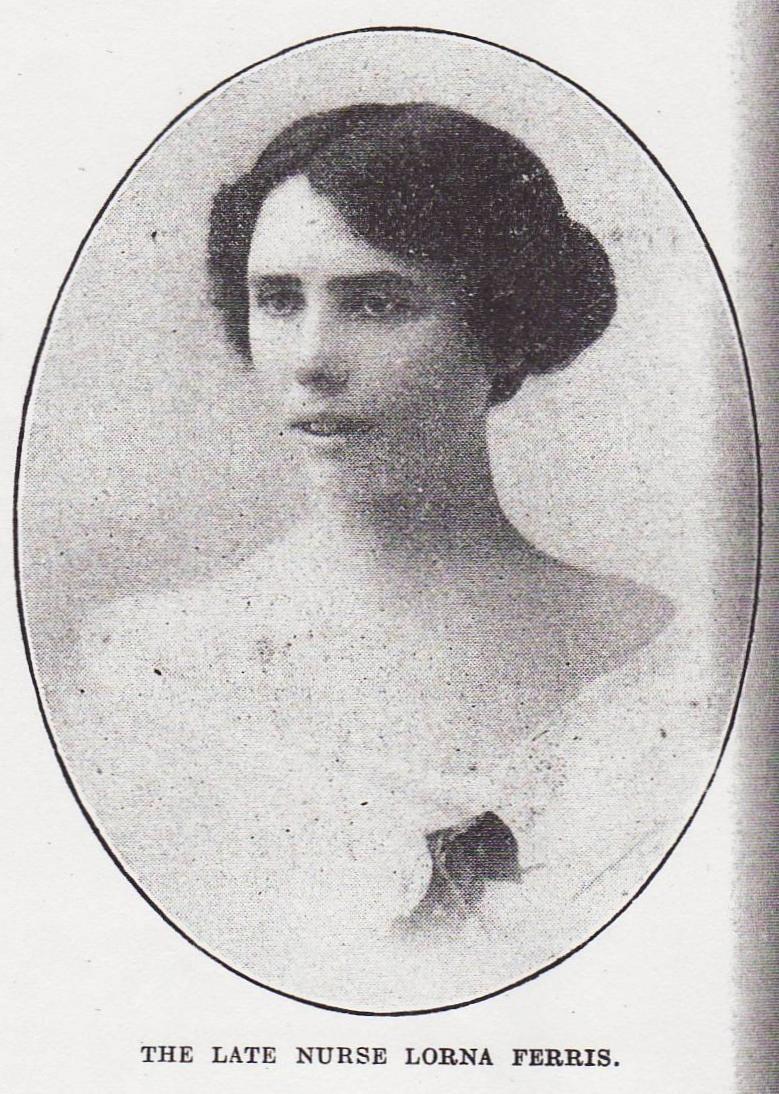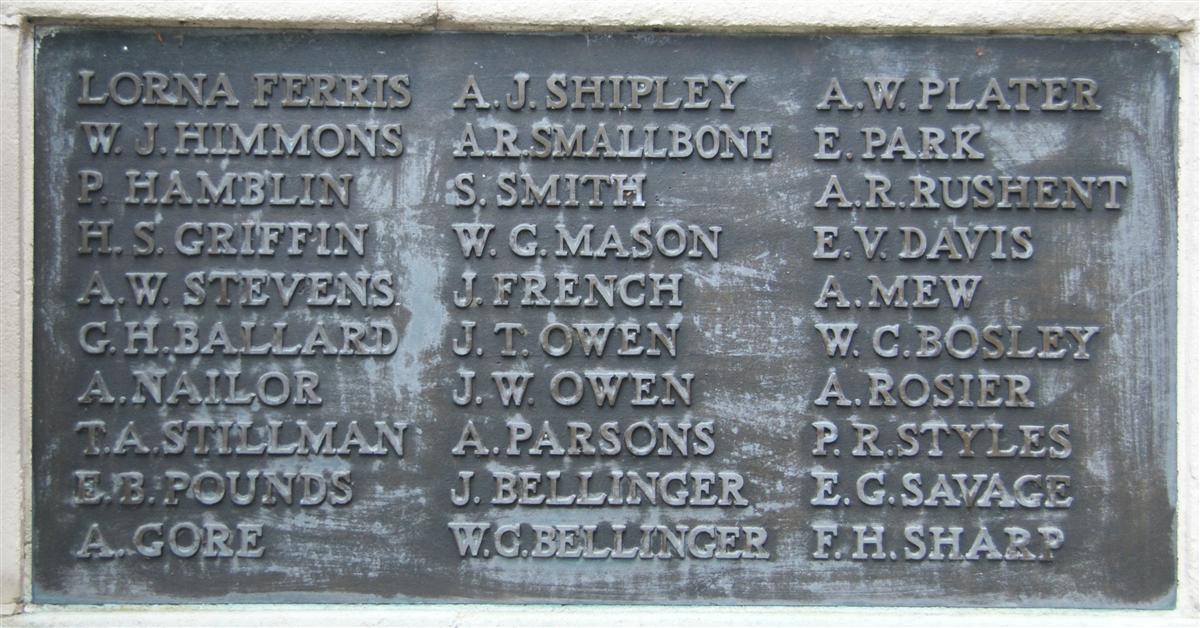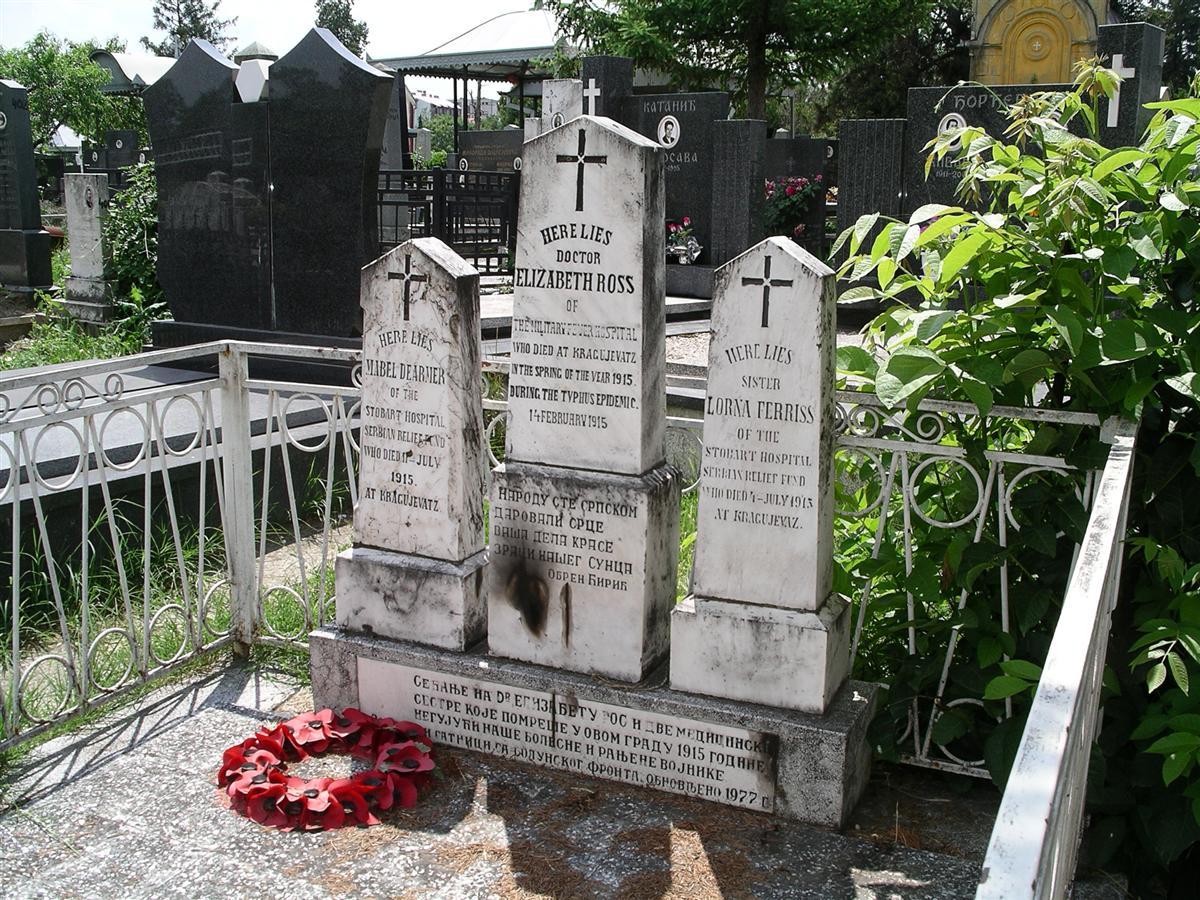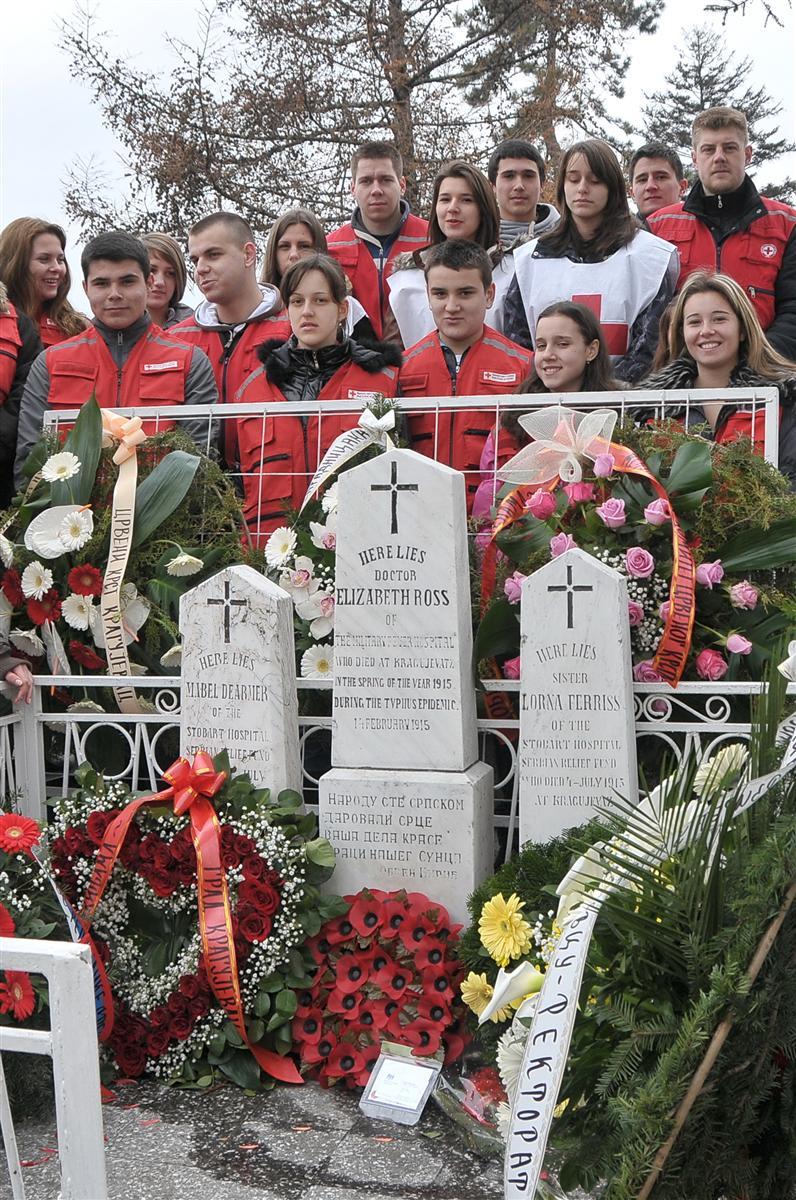Lorna Ferris
Nursing Sister Lorna Ferris, Stobart Hospital, Kragujevac, Serbian Relief Fund

Lorna Ferris |
Lorna was born in Newbury in late 1887 or early 1888 the second child of Henry Ferris and his wife Amelia (née Rosier).
She trained as a nurse at the Dreadnought Seaman's Hospital, Greenwich before spending a year at the Samaritan Free Hospital for Women in Marylebone Road, London. In April, 1915, she travelled to Serbia with Mabel Stobart, to set up a tented hospital camp at a disused racecourse outside Kragujevac, which was then hardly more than a town.
She made a strong impression on her colleagues, who recorded much about her and her character. She was a “strong, healthy girl of 25,” a “good nurse with a bright, cheerful manner” who was due to be married just two months later. But what impressed her colleagues most was her facility for languages. “She knew Serbian better than anyone in the camp and could sing the Serbian anthem,” recalled one. “She, almost alone of all the nurses, had not been content with the ‘Dobro’ dumb show language, but had troubled to learn Serbian, and had made excellent progress," wrote Mabel Stobart, who headed the Unit.
She fell ill with typhoid and met her illness with characteristic good cheer. “I went to have a peep at all our poor invalids,” wrote the Unit’s head cook, Monica Stanley. “When the poor girl saw me she looked up and smiled and waved to me. I little thought it would be the last time I should see her. Nurse Ferris and I always had little jokes together when she came to meals; she was beloved by all in her ward.” She died on 4 July 1915. She was the first and youngest of Mabel Stobart's volunteers to die in Serbia.
Her story is told in two articles from the local paper:

Lorna's name on Newbury War Memorial (top left) |
Newbury Weekly News,
15 July 1915.
The sad intelligence has been received this week of the death of Miss Lorna Ferris, daughter of Mr and Mrs Henry Ferris, of London road, who volunteered as a nurse in Serbia. Particulars are not yet to hand as to the cause of death, but it is feared that she has fallen a victim to one of the terrible diseases decimating that country. The father was formerly colour-sergeant of the Newbury Volunteers, and on the outbreak of war placed his services at disposal. He went with the Berks Territorials into training, but the authorities failed to find any position in which he could serve his country.
Newbury Weekly News, 29 July 1915.
The funeral of Nurse Lorna Ferris, daughter of Mr and Mrs Henry Ferris of Newbury, led to an event which the “Church Times” thinks should be put on record. For the first time in the history of Serbia, an English service was held in a Serbian church. Those who are learned in precedents will be able to correct the presumption, if it is misplaced, but it is imagined that this is the first time that an English Church service has been held in any church of the Eastern Orthodox Communion. If so, it forms one more link, and a link of great importance, in the chain of friendship which is being formed between the Anglican and the Orthodox Churches of the East. Kraguyevatz, where Sister Ferris died, is the headquarters of the Serbian Army and of the Crown Prince of Serbia, its chief. The authorities arranged to give her a funeral with military honours, and asked if the English would like to have their own service in the principal church, the Cathedral of Kraguyevatz. They gladly assented, and the permission of the Metropolitan of Belgrade was sought. The reply of his Altitude was characteristically generous and charitable: “Let them do in our church exactly as they would do in their own church at home.”
The church was arranged on July 5, according to the custom here, with a candle surrounded by flowers in the midst under the dome. The hearse was preceded by the Crown Prince’s band, and was followed by the members of the Stobart Hospital in their uniforms, by two representatives of the Crown Prince, his Secretary and the Captain of his bodyguard, by three Serbian priests, the British, French and Russian military attaches, and by many doctors and nurses, Serbian, British, French and Russian, as well as by other civil and military officials, the British chaplain walking in his surplice behind the hearse and holding a taper according to the Serbian custom. The procession, thus composed, walked to the church, and thence, after that part of the Anglican Burial Service ordered by the rubric for use in church, had been said, it proceeded through the town to the cemetery, an hour’s march in all.
Particulars of Nurse Ferris’s death have been received in a letter from the superintendent of the hospital, who wrote: “She contracted typhoid, with several others of the staff, on June 7th. She had a relapse, and hemorrhage set in and she passed peacefully away on July 4th. She was universally loved in the unit, and is genuinely missed and regretted by all. She was a splendid nurse, and with a natural gift for languages, had made wonderful progress in the Serbian language, and was therefore a great favourite with her Serbian soldier patients. She had a brave spirit, and indeed she kept at work and said nothing of feeling unwell for two or three days before she went to bed.”
A few more details emerged later that year:

Lorna Ferris' grave (left) in Kragujevac, alongside those of Dr Elizabeth Ross and Mabel Dearmer |
Newbury Weekly News,
9 December 1915.
Tribute has been paid to the memory of Nurse Lorna Ferris, daughter of Mr and Mrs Henry Ferris, London-road, Newbury, who, as previously announced in these columns, died while on nursing service in Serbia. Dr Dearmer writes:- "Nurse Lorna Ferris died of enteric fever at the Stobart Hospital, Kragujevatz. She was trained at the Dreadnought Hospital, Greenwich (remaining there four years), and then went as staff nurse to the Samaritan Free Hospital for one year. In camp she had won the affection and esteem of all, and was one of the best, most willing, and efficient nurses. She was buried with full military honours, and HRH the Crown Prince of Serbia was represented by his secretary and the captain of his bodyguard. Mrs Stobart and the members of the hospital, followed the hearse, together with a large company of Serbian officers and doctors, the British, French, and Russion. By special permission of the Metropolitan of Belgrade, the service was conducted by the British chaplain in the cathedral at Kragujevatz, this being probably the first time in history that an English service has been held in a church of the Eastern orthodox communion. She has died doing her duty." The King of Serbia's medal and diploma have been sent to the deceased parents

The annual ceremony in Kragukevac cemetery, remembering the three women from Britain who gave their lives to help Serbians. More pictures |
Despite the precaution of vaccination before she reached Serbia, typhoid claimed another victim. She is buried alongside two other women, Dr Elizabeth Ross and Mabel Dearmer (wife of Percy Dearmer) in Kragujevuc, all three died of disease in 1915. The three women's sacrifice for Serbia is still remembered at an annual ceremony held at the three graves every February 14th. The ceremony is a huge event for the town. It is attended by city dignitaries, Red Cross officials, ambassadors and representatives of the Serbian Army, along with many ordinary citizens. The Bishop of Šumadija (the eparchy or see administered from Kragujevac), along with two other Serbian Orthodox priests, hold the ceremony.
The group of headstones includes the epitaph: They gave their hearts to the people of Serbia.
As the organisation she served with (the Serbian Relief Fund) has not been recognised as a British or Empire organisation, Lorna is not recorded in the Commonwealth War Graves Commission roll of honour. However, she is commemorated in York Minster on the Women's National Memorial Screen.
Locally she is remembered on the Newbury Town War Memorial. Her name is the first to appear on the memorial, in recognition that she was the only woman from Newbury to die while serving in the Great War.
Thanks to Louise Miller for the photographs of Lorna and Kragujevac used in this story - and for her words, which I have shamelessly reused in places (I hasten to add that all errors are mine). To view a documentary on the nurses in Serbia during the Great War, featuring Louise Miller click here.

Find a memorial :
| Died this day: | |
| 02 March 1918 | |
| N G Burgess | |
| Newbury |

Like this site? Show your appreciation through a donation to a great charity.